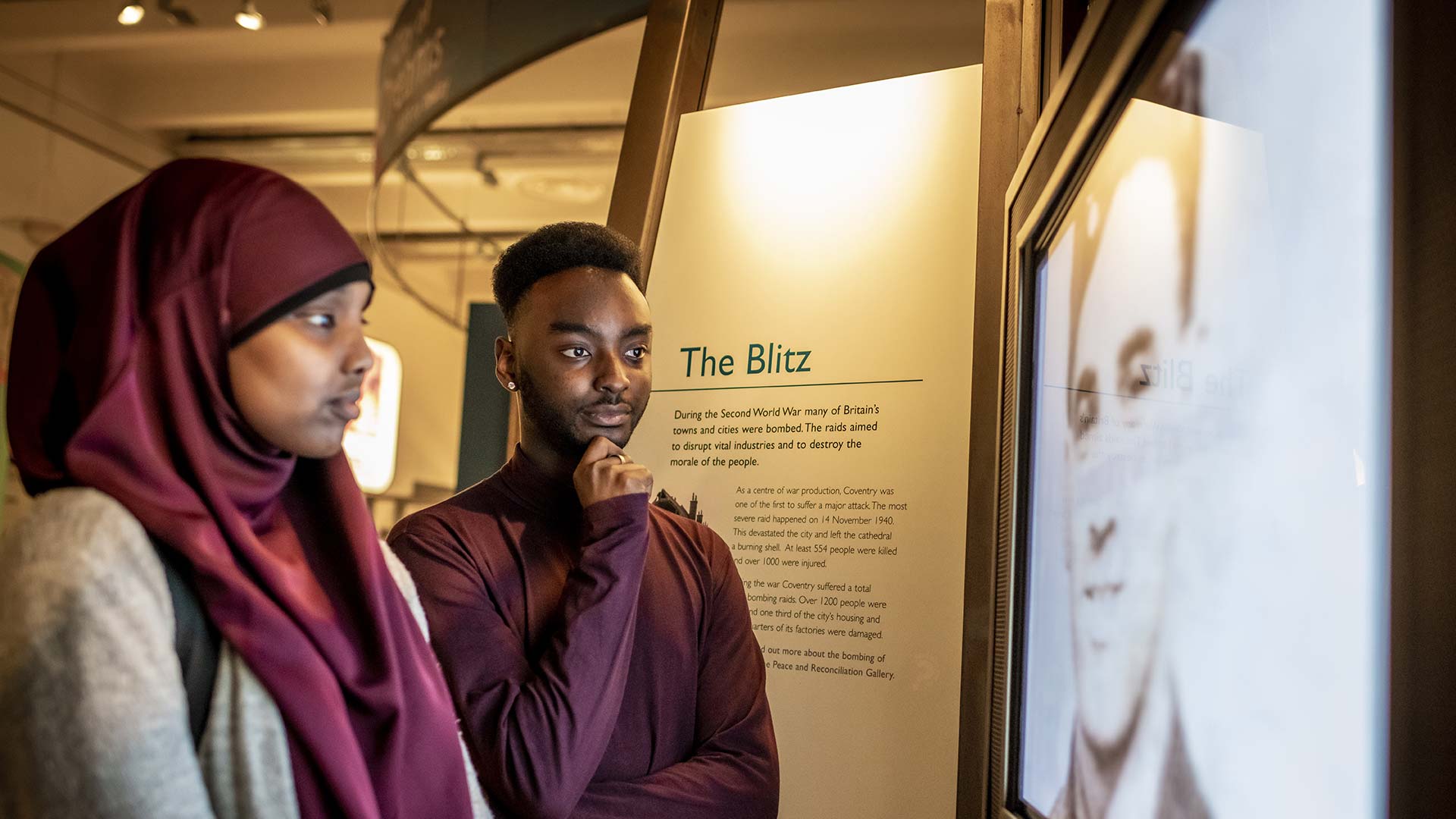Search
Sociology BA (Hons)
Study level: Undergraduate
Sociology is ideal for you if you have an inquisitive mind ready to engage with social issues in tumultuous times. We examine diverse societies and the experiences of different individuals and groups.
Course features
Year of entry
Location
Coventry University (Coventry)
Study mode
Full-time
Part-time
Sandwich
Duration
3 years full-time
4 years sandwich
Flexible part-time
Course code
L300
Start date
September 2025
The information on this page is for 2024-25 entry and should be used as guidance for 2025-26 entry. Please keep checking back on this course page to see our latest updates.
Course overview
You’ll explore the pressing issues of modern-day society in the UK and internationally, including: inequalities and social injustice, body, self and identities, race and racism, gender, sex and sexuality, crime and punishment, media and popular culture, families and personal relationships and much more.
- You’ll have opportunities to apply to work in diverse situations on short and long-term placements2. This can provide the opportunity for practical, real-life experience that’s relevant to your future career aspirations.
- Studying sociology should help you develop your own sociological imagination. Upon successful completion, you will gain a critical understanding of the contemporary world, human behaviour and the forces shaping society.
Joint Top Modern University for Career Prospects
Guardian University Guide 2021 and 20225 QS Stars for Teaching and Facilities
QS Stars University RatingsTop 5 UK Student City (Coventry)
QS Best Student Cities Index 2023Why you should study this course
The Sociology team at Coventry are committed to your academic and personal development. Student support is one of our top priorities and you’ll be joining a welcoming, friendly and inclusive community. You will be taught by a combination of qualified educationalists, active researchers who are experts in their chosen fields (Staff may be subject to change). Other benefits include the following:
- A range of topics covered on the course can include gender, sexuality, race, class, disability, crime and identities.
- Opportunities to expand international experience by participating in studying or working abroad2.
- Opportunities to develop skills that potential and future employers desire from graduates, such as: workload and project management, presentational, verbal and written communication skills, working with others, and critical thinking.
- Current excellent professional links with local and national employers and visiting speakers from areas of industry and practice relevant to your sociology course2 (subject to availability).
School of Humanities Showcase
Presenting two dedicated events, our student conference and an interactive online learning experience exploring global climate change.
Find out more
What you'll study
This course has a common first year.
The common first year enables you to work alongside students doing similar courses to you, to widen your knowledge and exposure to other subject areas and professions. You will have the opportunity to collaborate with other students, so you can share your insights and experience which will help you to develop and learn.
If you discover an interest in a specific subject you have studied, upon successful completion of your first year, you could swap degrees with another course in your common first year (subject to meeting progression requirements).
Common first year courses
- Sociology BA (Hons)
- Sociology and Criminology BA (Hons)
We regularly review our course content, to make it relevant and current for the benefit of our students. For these reasons, course modules may be updated.
How you'll learn
This course can be offered on a part-time basis. Whilst we would like to give you all the information about our part-time offering here, it is tailored for each course each year depending on the number of part-time applicants. Therefore, the part-time teaching arrangements vary.
Request further information about part-time study.
Teaching contact hours
We understand that everyone learns differently, so each of our courses will consist of structured teaching sessions, which can include:
- On campus lectures, seminars and workshops
- Group work
- Self-directed learning
- Work placement opportunities2.
The number of full-time contact hours may vary from semester to semester, however, on average, it is likely to be around 12 contact hours per week in the first and second year dropping to around 10-12 contact hours per week in the third and final year as you become a more independent learner.
Additionally, you will be expected to undertake significant self-directed study of approximately 15 hours each week, depending on the demands of individual modules.
Part of university life is undertaking self-directed learning. During a typical week you will have time that allows you to work independently to apply the skills and knowledge you have learnt in taught or facilitated sessions to your projects or assignment briefs. This self-directed learning allows you to use your research skills, consolidate your knowledge or undertake collaborative group work.
Since COVID-19, we have delivered our courses in a variety of forms, in line with public authority guidance, decisions, or orders and we will continue to adapt our delivery as appropriate. Whether on campus or online, our key priority is staff and student safety.
Assessment
This course will be assessed using a variety of methods which will vary depending upon the module.
Assessment methods can include:
- Phase tests
- Essays
- Group work
- Presentations
- Reports
- Projects
- Coursework
- Individual assignments
The Coventry University Group assessment strategy ensures that our courses are fairly assessed and allows us to monitor student progression towards achieving the intended learning outcomes.
International experience opportunities
One of the main features of this course is its international focus. Our lecturers come from across the world and have expertise in international issues, global development and comparative sociology. (staff are subject to change)
There are opportunities for study or placements abroad. For example, past students have studied on a range of courses at universities in Sweden, Spain, Italy and the Netherlands2.
To ensure that you fully understand the visa requirements, please contact the International Office.
The modules were a great mix between traditional sociology and contemporary topics, along with some interconnecting modules with criminology which I’m also interested in. The vast array of the content covered is so interesting, alongside the passionate and experienced lecturers.
Bethany Smith, final year Sociology BA (Hons) student, 2020

Entry requirements
Typical offer for 2024/25 entry.
Fees and funding
2024/25 tuition fees.
| Student | Full-time | Part-time |
|---|---|---|
| UK, Ireland*, Channel Islands or Isle of Man | 2025/26 fees TBC 2024/25 fees - £9,250 per year |
Request fee information |
| EU | 2025/26 fees TBC 2024/25 fees - £9,250 per year with EU Support Bursary** 2025/26 fees TBC 2024/25 fees - £16,800 per year without EU Support Bursary** |
Not available |
| International | 2025/26 fees TBC 2024/25 fees - £16,800 per year |
Not available |
If you choose to do a work placement2, you should consider travel and living costs to cover this. There is also a tuition fee3 of £1,250 that will cover your academic support throughout your placement year.
For advice and guidance on tuition fees and student loans visit our Undergraduate Finance page and see The University’s Tuition Fee and Refund Terms and Conditions.
We offer a range of International scholarships to students all over the world. For more information, visit our International Scholarships page.
Tuition fees cover the cost of your teaching, assessments, facilities and support services. There may be additional costs not covered by this fee such as accommodation and living costs, recommended reading books, stationery, printing and re-assessments should you need them. Find out what's included in your tuition costs.
The following are additional costs not included in the tuition fees:
- Any optional overseas field trips or visits: £400+ per trip.
- Any costs associated with securing, attending or completing a placement (whether in the UK or abroad).
*Irish student fees
The rights of Irish residents to study in the UK are preserved under the Common Travel Area arrangement. If you are an Irish student and meet the residency criteria, you can study in England, pay the same level of tuition fees as English students and utilise the Tuition Fee Loan.
**EU Support Bursary
Following the UK's exit from the European Union, we are offering financial support to all eligible EU students who wish to study an undergraduate or a postgraduate degree with us full-time. This bursary will be used to offset the cost of your tuition fees to bring them in line with that of UK students. Students studying a degree with a foundation year with us are not eligible for the bursary.
Facilities
Students will benefit from studying on our well-equipped, modern campus4.

Academic support
No matter which degree you’re studying, you’ll find a lot of support on campus, including the Centre of Academic Writing and sigma, which offers mathematics and statistics support.

The Library
You will benefit from our support designed to help you succeed and our industry-relevant teaching and resources. These include our modern library and computing facilities, dedicated careers advice and Students’ Union.

Confucius Institute
The School of Humanities is home to the Confucius Institute. This is a collaboration created through a partnership with Jiangxi University of Finance and Economics, which aims to promote an understanding of the Chinese language and culture.
Careers and opportunities
On successful completion, you will be able to:
- Demonstrate systematic knowledge and critical understanding of sociological thought and how this develops from empirical research and theorising.
- Evidence systematic knowledge and critical understanding of social issues and social problems that are central to sociological debates.
- Develop critical knowledge and awareness of the ethical, political, socio-economic, cultural, and global contexts that frame sociological investigation.
- Demonstrate and recognise their abilities to locate, generate, critically analyse, and interpret data and information, and construct evidence-based and theoretically informed arguments.
- Reflect on their own perspectives and positionality in relation to the viewpoints expressed in the learning community of social science.
- Acquire and exemplify transferable skills that can be applied in both scholarship and research and in professional working environments.
Upon successful completion of our course, you can be equipped with a range of skills and competencies that make you attractive to potential employers.
We’re committed to preparing you for your future career and aim to give you a competitive edge in the graduate job market. The university's dedicated employability support, the Talent Team, provides a wide range of support services to help you plan and prepare for your career4.
Where our graduates work
Past graduates are now employed in the private sector in industries ranging from banking and finance to media, and across the public sector in education, the civil service, police forces, local authorities, charities and Non-Governmental Organisations (NGOs).
Further study
You can choose to continue your studies at Coventry University with the Sociology and Social Research MA. You may be entitled to an alumni discount on your fees if you decide to extend your time with us by progressing from undergraduate to postgraduate study.
Graduate Immigration Route visa
Based on current information from the UK Government, international students whose study extends beyond summer 2021 may be eligible for a visa under the UK Government’s Graduate Immigration Route, which will enable students to stay and work, or look for work, in the UK at any skill level for up to two (2) years. Check the most up to date guidance available to check your eligibility and any updates from the UK Government before making an application or enrolment decision.
How to apply
You may also like

Sociology and Criminology BA (Hons)

Politics BA (Hons)




